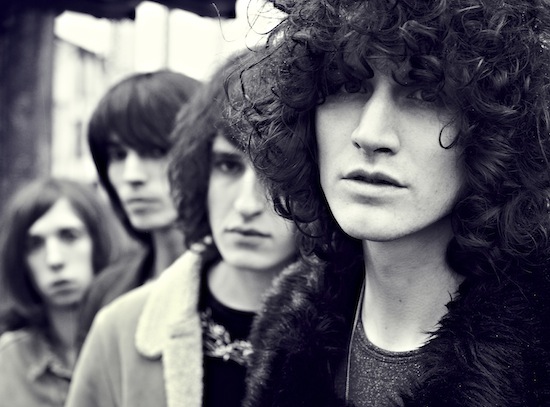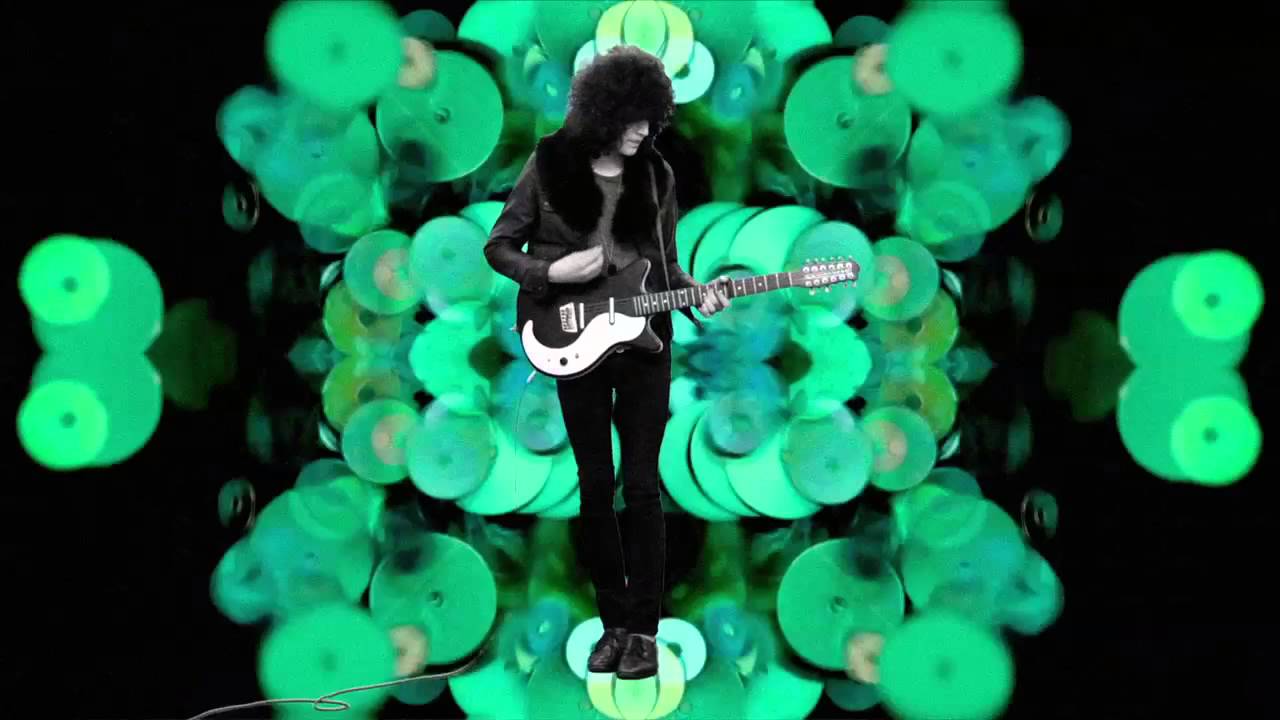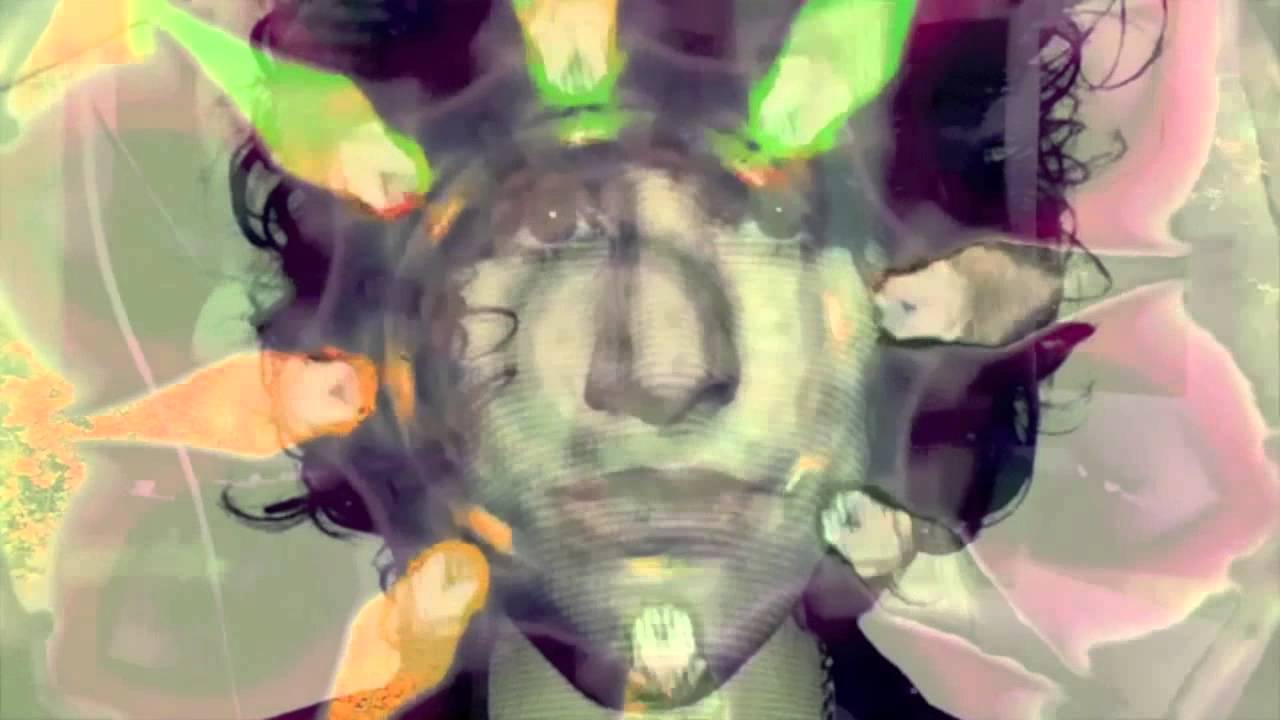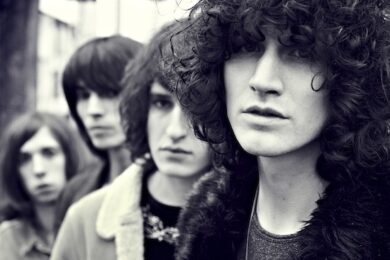Backstage, Temples keyboard player Adam Smith is ironing his shirt. "If it’s silk, you know you might put a hole through it," offers Tom Warmsley, bass player, backing vocalist and co-founder. "Put a towel over it and then do it," adds his fellow founder, singer and guitarist James Bagshaw, who quickly adopts the stiff English accent you’d associate with such sartorial know-how: "And then you won’t get any of those bloody creases."
Such close attention to specifics seems to befit Temples. Not only do they look the part – nowhere more so than when dappled by the sun-blushed, psychedelic hues of the light show that accompanies their gig the same evening – but their tracks (only four have been physically released so far, but are soon to be followed by more) are increasingly fine-honed cuts.
Their first single and calling card is last year’s ‘Shelter Song’, a jerky earworm of a 12-string guitar riff with a loping rhythm section, elegantly rough-hewn with vocals rendered in ’60s-style tinny sonic relief. The group’s follow-up single ‘Colours To Life’, released in June, was rooted in similarly concise pop song form, but found them foregrounding its spectral keyboards and pushing into increasingly expansive terrain.
Signed to Heavenly Recordings, and making up the label’s fine roster of guitar bands this year, along with TOY, Stealing Sheep and Charlie Boyer & The Voyeurs – "hopefully, we’re the four corners of the Heavenly square", says Warmsley – the four-piece, completed by the appropriately named Sam Toms on drums, are based in their home town of Kettering. However, they’re currently on the road working through an exhaustive tour schedule, taking in a recent support slot for the Rolling Stones at Hyde Park, and have a number of festival sets coming up, including one at Latitude Festival this weekend.
The Quietus sat down with the band to speak about their background, taking the lead from their favourite producers and a particularly fine piece of correspondence with Robert Wyatt.
How did the band come together?
Tom Warmsley: It started off as a recording project between me and James, at the end of last summer. We’d been sharing records and had known each other for years. We decided that we’d start writing together and recorded a few demos, didn’t put too much thought into them, but we knew what we wanted to do. We put them up on YouTube and it got quite a response, so we thought we’d better make this into a gigging band, which we hadn’t really considered at the beginning.
‘Colours To Life’
What were the demos?
James Bagshaw: We had four songs, of which ‘Shelter Song’ was the first one we did together, and there was ‘The Golden Throne’, ‘The Guesser’ and ‘Keep In The Dark’. The original plan was that we wanted to have an online EP; obviously at the time, we’d have loved to have a record label and get signed. We had no idea that we would get signed.
Had you played music together before?
TW: We’d been in rival bands in Kettering, it’s a small town.
JB: We kind of jammed, and at the time we were both really into The Doors and loved anything organ-based. Tom was new to writing and it was a case of him probably not having as much confidence as I did at the time, because I’ve probably been writing for longer, and what happened was really natural. It took a bit of work at first, but now it’s given us a loose formula as to how to move on.
You’ve recorded and produced the material yourselves. What’s your set up like?
JB: It’s actually done in the room where I was brought up, the box room – this tiny 6′ by 4′ room. It’s recorded in there and I use my bedroom as a live room. I don’t think that necessarily adds to anything, but you work with what you have, you get over the limitations. It might be that you can’t record drums because it’s past ten o’clock at night, so you go down different routes, you might play around with electronic drums in headphones, it pushes you in different ways.
The recordings have a very specific sound – do you strive for that? Are you perfectionists in the studio?
TW: The songs that are released at the moment are essentially demos, but the great thing about having a studio at James’ is that as you write, you can record it instantly, so you can build the picture of the song straight away. Record as you go along, and it really fast tracks that process of demoing, going to a studio, getting a producer involved; we can do it all instantly. We found some sounds we liked and went with them, we didn’t think about it too much and weren’t guided by many rules. When you’re in a professional studio, there’s always constraints and keeping it below certain levels, but we weren’t afraid to try stuff out, and we got a basic formula for how we wanted drums to sound and for the bass to lock in with it and vocals.
JB: It wasn’t a laborious process of going through records and thinking, ‘Right, we’re going to come up with our own sound, amidst all of the other bands’, Tame Impala and the others who are doing psychedelic music. It came by easily and organically. Tom will come round and I’ll have a drum sound that sounds as Motown as it can without being Motown and it would just be a case of things like that, bringing it together. Certainly ideas-wise there’s no limitations at all. You’re not worried about getting a great old bill for hiring equipment, as you’re just working with what you have.
You’ve done a good job so far. Are you going to get a producer in in the future?
JB: I think we’ll judge it track by track. In the same way as when you’re writing and producing, where you make decisions based on instinct, things like whether it’s an acoustic or an electric guitar, certain tracks are destined to go places that you might not be able to take them. I think it’s really good working with this guy Claudius [Mittendorfer], he totally understood what we’ve done with the production and the way we recorded it. All he actually did with it is pushed it further than we could with the gear that’s in my house. There’s only so much you can do and he’s got a great desk in his studio in New York that he can run it through, and it just means that the chorus really smashes you in the face, whereas [otherwise] it can be a little flat.
Where does the psychedelic influence come from?
TW: I think a mutual love was all those psychedelic records. Years ago, we shared that stuff and tastes kind of develop, but I think the songwriting from that era, that style sticks with you. Anything that we do now, although there’s other influences in there, more experimental and electronic, stuff from the ’70s and even the sampling from the ’90s, there’s still that ’60s crafting of a pop song that remains. But the challenge is to avoid any pastiche, so it sounds fresh and original while borrowing from that [period]. It’s a very fine line, I think.
JB: Because of the sound of ’60s pop and the integrity with which it was recorded, I think producers we’re both really keen on, they obviously come into the Temples sound. We love Jack Nitzsche, and in the ’70s Tony Visconti and what he did, completely pioneering a new sound.
TW: It seems like the songwriters who had a hand in production are always the most advanced, they sort of had this alien element to them – Bowie, Bolan, Todd Rundgren – almost ahead of its time and with a timeless quality to it. So that’s a reference for us as well when we’re writing and looking for sounds.
‘Shelter Song’
Is there a sense in which your music is has an escapist feel? Sonically and lyrically, it feels you’ve cultivated your own very specific world.
TW: One of the reasons we called the band Temples is that we wanted a name that was as symbolic and spiritual and cinematic as the music we were trying to create. Imagery in music and the visuals that you can get with lyrics are really important, it has almost a concept feel to some of it.
What are the next steps?
TW: We’ve just been writing the whole time and haven’t wanted to stop or lose momentum with that, whilst doing as many gigs as we can. We’ve written almost an album’s worth of material, so it’s just about taking our time with it as well, so hopefully by the end of the year there’ll be a record out there.
JB: We have got a record’s worth of songs that we’re very happy with and certain songs that we’d like to revisit from doing the songs live, you see songs in a different way. Almost a production element can come from playing live – "the guitars should be wilder there", it should come down a lot more dynamically. We’re obviously touring at the moment, but when we have a bit of time off, there’s going to be so many ideas, even with songs that aren’t finished, we’ll revisit them in a new way. We’re not going to rush the album out, because you never know; it might not, they might be terrible songs, but you only know by doing it.
You’ve been namechecked by some big names – Johnny Marr, Suede and Noel Gallagher singing your praises. How does that feel?
TW: It’s great if they like it and it’s nice to be respected by other musicians. I almost feel like it doesn’t involve us because they’ve obviously bought into that concept we were talking about earlier, that’s appealed to them, so I feel a little bit removed from it I guess.
JB: It doesn’t feel like they’re saying they like our music, it’s that they like Temples’ music. Obviously, we’ve recorded it, but it doesn’t feel that personal. You have moments where it does and it’s overwhelming, in a really positive way. Certainly these are people that we looked up to, when we were younger as well, because they were part of these massive bands, I think it’s really great. I think all musicians, when they hear something good, you can’t deny it; it’s the people that aren’t very good, I think, that deny it. People that know something’s good, they shout about it, because they love the art of music.
TW: We got a really nice letter from Robert Wyatt from Soft Machine. Ages ago we asked him to do a remix of ‘Shelter Song’, but he just sent this lovely letter back, describing all the sounds he heard in the song, using really abstract nouns and weird adjectives: "fizzy, chassis vocals", something like that. That was great, as we’re huge Soft Machine fans.
Temples play the following tour dates over the summer. They are also embarking on a full UK tour in October – for full list of dates click here.
JULY
Sat 6 – Hyde Park, London w/ Rolling Stones
Sun 7 – Beat Herder festival, Clitheroe
Sun 21 – Latitude festival, Southwold
Fri 26 – Secret Garden Party, Huntingdon
Sat 27 – Stockton Weekender, Stockton
AUGUST
Sat 17 – Beacons festival, Skipton
Fri 23 – Sun 25 – Reading/Leeds Festival, Reading/Leeds
SEPTEMBER
Fri 13 – Festival No.6, Portmeirion





